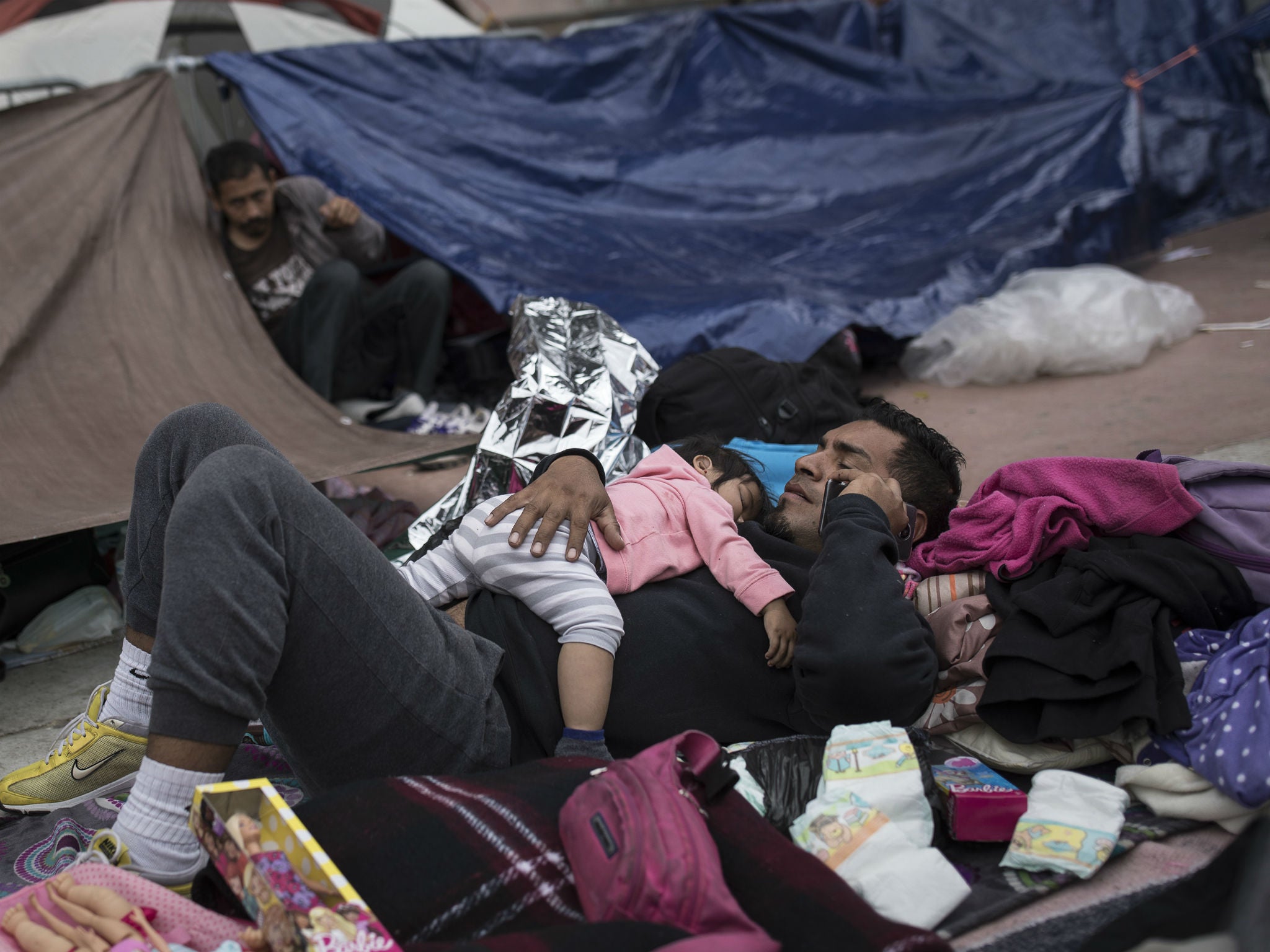First Central American caravan members allowed to cross into US
Donald Trump has denounced the caravan as a symbol of weak immigration laws

Your support helps us to tell the story
From reproductive rights to climate change to Big Tech, The Independent is on the ground when the story is developing. Whether it's investigating the financials of Elon Musk's pro-Trump PAC or producing our latest documentary, 'The A Word', which shines a light on the American women fighting for reproductive rights, we know how important it is to parse out the facts from the messaging.
At such a critical moment in US history, we need reporters on the ground. Your donation allows us to keep sending journalists to speak to both sides of the story.
The Independent is trusted by Americans across the entire political spectrum. And unlike many other quality news outlets, we choose not to lock Americans out of our reporting and analysis with paywalls. We believe quality journalism should be available to everyone, paid for by those who can afford it.
Your support makes all the difference.Breaking an impasse at the border, the first members of a caravan of undocumented immigrants were allowed to cross into the US from Mexico and apply for asylum.
“We began processing undocumented arrivals again on Monday”, a US Customs and Border Patrol spokesman said.
More than 100 Central Americans arrived at the border on Sunday evening, saying they were seeking a refuge from violence and chaos in their home countries.
They were initially barred from entering and presenting their claims, with immigration officials said they lacked the capacity to process people. Numerous caravan members spent the night sleeping outside.
But eight people - two women with two children apiece - were allowed to pass through and claim asylum, organisers said. Other members of the group reacted by immigrants cheering, dancing and breaking into chants of Si Se Puede (yes we can).
The remaining group may need to remain in Mexico, where they slept for a second night, as they wait for a chance to present their claims. It may be an extended delay.
“The number of inadmissible individuals we are able to process in a day varies based on the complexity of the cases, resources available, medical needs, translation requirements, holding/detention space, overall port volume and enforcement actions”, the Border Patrol said.
Organisers of the caravan - a binational effort that has enlisted attorneys and activists on both sides of the US-Mexico border - have cast doubt on the Border Patrol’s explanation for the wait, charging that immigration officials are intentionally obstructing caravan members amid a charged political climate.
“The US is breaking the law by turning asylum seekers away, and the false claim that they are at capacity is less believable by the hour”, organiser Alex Mensing told the Independent.
As the caravan traveled north from Central America, dwindling from its initial size of more around 1,200 people, it attracted the attention and then condemnation of the Trump administration.
Donald Trump has held the caravan up as a symbol of a porous border and a justification for more stringent immigration laws, blasting it on Twitter and in speeches.
“The migrant ‘caravan’ that is openly defying our border shows how weak & ineffective U.S. immigration laws are”, Mr Trump said.
Similarly, top administration officials have responded to the caravan by warning about penalties for immigration fraud, suggesting some asylum-seekers intend to present false claims. Attorney General Jeff Sessions called the caravan “a deliberate attempt to undermine our laws and overwhelm our system”.
While Mr Trump has invoked immigrants illegally crossing the border as a reason to construct a wall, the process for seeking asylum is different. American laws allow immigrants without documentation or visas to present themselves and claim asylum at ports of entry like the San Ysidro crossing where the caravan members are marooned.
To secure a hearing before an immigration judge, in which they would seek legal status to remain in America, they must first pass what’s known as a “credible fear” interview in which they prove they have reasons to fear persecution if they return to their home countries.
In the interim, people who are granted an interview with a judge but are still awaiting a hearing can face extended detention.
The rules on releasing immigrants versus detaining them until their hearings vary, depending on whether the people involved are unaccompanied minors, mothers with children or adult men, but Mr Trump and other administration officials contend that releasing immigrants allows them to disappear and remain in the country illegally.
Conversely, immigration advocates say the administration has unjustifiably detained asylum-seekers who have credible cases and do not pose flight risks.
Join our commenting forum
Join thought-provoking conversations, follow other Independent readers and see their replies
Comments